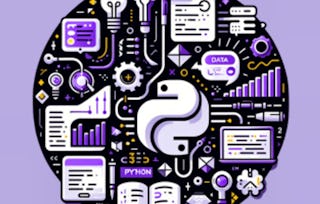e.g. This is primarily aimed at first- and second-year undergraduates interested in engineering or science, along with high school students and professionals with an interest in programmingGain the skills for building efficient and scalable data pipelines. Explore essential data engineering platforms (Hadoop, Spark, and Snowflake) as well as learn how to optimize and manage them. Delve into Databricks, a powerful platform for executing data analytics and machine learning tasks, while honing your Python data science skills with PySpark. Finally, discover the key concepts of MLflow, an open-source platform for managing the end-to-end machine learning lifecycle, and learn how to integrate it with Databricks.

Spark, Hadoop, and Snowflake for Data Engineering

Spark, Hadoop, and Snowflake for Data Engineering
This course is part of Applied Python Data Engineering Specialization



Instructors: Noah Gift
13,900 already enrolled
Included with
63 reviews
Recommended experience
What you'll learn
Create scalable data pipelines (Hadoop, Spark, Snowflake, Databricks) for efficient data handling.
Optimize data engineering with clustering and scaling to boost performance and resource use.
Build ML solutions (PySpark, MLFlow) on Databricks for seamless model development and deployment.
Implement DataOps and DevOps practices for continuous integration and deployment (CI/CD) of data-driven applications, including automating processes.
Skills you'll gain
- Python Programming
- Data Pipelines
- Database Architecture and Administration
- Distributed Computing
- Data Transformation
- Big Data
- PySpark
- Data Warehousing
- Databricks
- Data Quality
- Data Processing
- Apache Hadoop
- DevOps
- MLOps (Machine Learning Operations)
- Data Integration
- SQL
- Apache Spark
- Skills section collapsed. Showing 11 of 17 skills.
Details to know

Add to your LinkedIn profile
21 assignments
See how employees at top companies are mastering in-demand skills

Build your subject-matter expertise
- Learn new concepts from industry experts
- Gain a foundational understanding of a subject or tool
- Develop job-relevant skills with hands-on projects
- Earn a shareable career certificate

There are 4 modules in this course
In this module, you will learn how to work with different data engineering platforms, such as Hadoop and Spark, and apply their concepts to real-world scenarios. First, you will explore the fundamentals of Hadoop to store and process big data. Next, you will delve into Spark concepts, distributed computing, deferred execution, and Spark SQL. By the end of the week, you will gain hands-on experience with PySpark DataFrames, DataFrame methods, and deferred execution strategies.
What's included
10 videos10 readings7 assignments1 discussion prompt2 ungraded labs
In this module, you will explore the Snowflake platform, gaining insights into its architecture and key concepts. Through hands-on practice in the Snowflake Web UI, you'll learn to create tables, manage warehouses, and use the Snowflake Python Connector to interact with tables. By the end of this week, you'll solidify your understanding of Snowflake's architecture and practical applications, emerging with the ability to effectively navigate and leverage the platform for data management and analysis.
What's included
8 videos5 readings6 assignments
In this module, you will practice the essential skills for seamlessly managing machine learning workflows using Databricks and MLFlow. First, you will create a Databricks workspace and configure a cluster, setting the stage for efficient data analysis. Next, you will load a sample dataset into the Databricks workspace using the power of PySpark, enabling data manipulation and exploration. Finally, you will install MLFlow either locally or within the Databricks environment, gaining the ability to orchestrate the entire machine learning lifecycle. By the end of this week, you will be able to craft, track, and manage machine learning experiments within Databricks, ensuring precision, reproducibility, and optimal decision-making throughout your data-driven journey.
What's included
16 videos7 readings4 assignments1 ungraded lab
In this module, you will explore the concepts of Kaizen, DevOps, and DataOps and how these methodologies synergistically contribute to efficient and seamless data engineering workflows. Through practical examples, you will learn how Kaizen's continuous improvement philosophy, DevOps' collaborative practices, and DataOps' focus on data quality and integration converge to enhance the development, deployment, and management of data engineering platforms. By the end of this week, you will have the knowledge and perspective needed to optimize data engineering processes and deliver scalable, reliable, and high-quality solutions.
What's included
21 videos7 readings4 assignments1 ungraded lab
Earn a career certificate
Add this credential to your LinkedIn profile, resume, or CV. Share it on social media and in your performance review.
Offered by
Explore more from Machine Learning
 Status: Free Trial
Status: Free Trial Status: Free Trial
Status: Free Trial Status: Free Trial
Status: Free TrialDuke University
 Status: Free Trial
Status: Free Trial
Why people choose Coursera for their career

Felipe M.

Jennifer J.

Larry W.

Chaitanya A.
Learner reviews
- 5 stars
52.38%
- 4 stars
17.46%
- 3 stars
9.52%
- 2 stars
9.52%
- 1 star
11.11%
Showing 3 of 63
Reviewed on Aug 6, 2024
Great course, detailed steps by step walkthrough that really simplifies understanding
Reviewed on Jan 15, 2024
A course that cover all aspects basic of data engineer, i love it

Open new doors with Coursera Plus
Unlimited access to 10,000+ world-class courses, hands-on projects, and job-ready certificate programs - all included in your subscription
Advance your career with an online degree
Earn a degree from world-class universities - 100% online
Join over 3,400 global companies that choose Coursera for Business
Upskill your employees to excel in the digital economy
Frequently asked questions
To access the course materials, assignments and to earn a Certificate, you will need to purchase the Certificate experience when you enroll in a course. You can try a Free Trial instead, or apply for Financial Aid. The course may offer 'Full Course, No Certificate' instead. This option lets you see all course materials, submit required assessments, and get a final grade. This also means that you will not be able to purchase a Certificate experience.
When you enroll in the course, you get access to all of the courses in the Specialization, and you earn a certificate when you complete the work. Your electronic Certificate will be added to your Accomplishments page - from there, you can print your Certificate or add it to your LinkedIn profile.
Yes. In select learning programs, you can apply for financial aid or a scholarship if you can’t afford the enrollment fee. If fin aid or scholarship is available for your learning program selection, you’ll find a link to apply on the description page.
More questions
Financial aid available,

